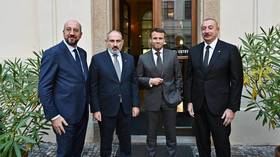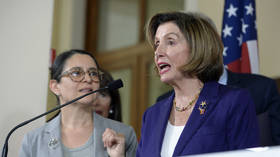Armenia and Azerbaijan agree to EU mission on border

The EU will launch a two-month civilian mission to define the border between Armenia and Azerbaijan, in a bid to resolve a long-running dispute, according to a statement by the European Council published on Friday.
Azerbaijan’s President Ilham Aliyev and Armenia’s Prime Minister Nikol Pashinyan met in Prague on Thursday at the invitation of French President Emanuel Macron and European Council President Charles Michel. Both leaders confirmed their commitment to recognize each other’s territorial integrity and sovereignty in accordance with the UN charter and the 1991 Alma Ata Declaration.
“There was an agreement by Armenia to facilitate a civilian EU mission alongside the border with Azerbaijan. Azerbaijan agreed to cooperate with this mission as far as it is concerned,” the council’s announcement reads.
The text explains that the civilian mission, which aims to “build confidence” and “contribute to the border commissions” will be dispatched to Armenia’s border with Azerbaijan later this month, and last for a maximum of two months.
The conflict stems from a decades-old territorial dispute over the Nagorno-Karabakh region, situated in Muslim-majority Azerbaijan but mostly populated by ethnic Christian Armenians. Yerevan has been supporting the region’s independence ever since it sought to break away from Bakus’s rule in the early 1990s.
Tensions between the two former Soviet republics erupted into an all-out war in 2020 which lasted for 44 days, ending with a Russia-brokered ceasefire. Last month, however, fighting broke out again as Armenia accused Azerbaijan of launching cross-border artillery and drone strikes. Baku insisted it was only responding to “provocations” from Yerevan.
Over 200 people were killed in the fighting before Baku “unilaterally” proposed a “humanitarian ceasefire,” stating it was not interested in escalating or destabilizing the situation any further, while Armenian Prime Minister Nikol Pashinyan called on the CSTO for military assistance, claiming that Azerbaijani troops had seized parts of his country’s territory.
The CSTO refused to send its forces to the Armenia-Azerbaijan border, insisting on resolving the issue using political and diplomatic methods. The bloc’s chief of joint staff, General Anatoly Sidorov, stated that any further decisions would be based on the results of a joint mission sent by the organization to Armenia.













